#Debt collection law
Text
Extra big shout out to my selfish aunt today for still not managing any of my dead grandfather’s affairs—even when she was given power of attorney and access to his account info specifically to do that for him—so that I’m getting debt collectors calling for all his overdue accounts almost two fucking years later. And I’m the lucky winner for this prize because my number happened to be on file from when I helped him set all his accounts up when I was living and taking care of him fulltime and being abused and treated like shit by him. 👍
Yes, I know she only agreed to it so she could slurp up any money she could from him while he was dying. No, I had no real expectations for her to do anything that benefits anyone else. I still thought maybe this time the work needed for this (like two phone calls and maybe an email of his death certificate) were simple and easy enough for her to manage for her own father, who she loves to go on and on about caring about and for when she did exactly jack shit for him. But I guess now that he’s gone, she can only trot out his corpse when she needs a show of sympathy when her attention meter gets too low. Why put in any effort now, when she couldn’t be bothered while he was alive, I guess.
Love being haunted by my shitty family in weird, ridiculous ways.
#tw: family death#tw: family abuse#I won’t go into the details but jfc#trust me the bar is in fucking hell and she’ll always go lower#personal#debt collection agency#oh and it’s a shady ass debt collector who calls at all hours and breaks the law#your reminder to report fuckers who do that#Batwynn Talks#I was already having a bad day#I haven’t slept well in weeks#I’m really genuinely tired#and they’ve called me non stop for days until I picked up
27 notes
·
View notes
Text
Get the best defender for your battle!
#Personal Injury Lawyer#Criminal Defense Attorney#Tenant Lawyer#Eviction Defense Attorney#Lemon Law Attorney#Debt Collection Lawyer#Slumlord Litigation Lawyer#los angeles
11 notes
·
View notes
Text
debt settlement leads
Unveiling the Potential of Debt Settlement Leads

In the realm of financial services, "debt settlement leads"represent a crucial gateway to helping individuals and businesses navigate challenging financial situations. These leads are not merely entries in a database but opportunities to provide targeted assistance and solutions that can transform a client's financial landscape. Understanding the dynamics and intricacies of debt settlement leads unveils a unique niche within the broader financial services sector.
Understanding Debt Settlement Leads
Debt settlement leads typically originate from individuals or businesses struggling with overwhelming debt burdens. These leads are often generated through various channels such as:
Online Inquiries: Individuals searching for debt relief options actively seek information online, generating leads through forms, websites, or online advertisements.
Referrals: Financial advisors, attorneys, or previous clients may refer individuals or businesses facing debt challenges, creating warm leads.
Direct Outreach: Outreach efforts including cold calling or direct mail campaigns targeting demographics likely to need debt settlement services.
Each lead represents a distinct financial situation with its own set of challenges and opportunities. The process of debt settlement involves negotiating with creditors on behalf of the debtor to reduce the total amount owed, often resulting in a structured repayment plan that is more manageable for the debtor.
Unique Challenges and Solutions
Navigating the world of debt settlement leads requires expertise in financial analysis, negotiation skills, and a deep understanding of regulatory frameworks. Unlike other financial services, debt settlement requires empathy and strategic thinking to ensure that solutions are tailored to each client's specific needs. Here are some unique aspects of handling debt settlement leads:
Customized Approaches: Each lead requires a customized approach based on the amount of debt, type of creditors involved, and the financial capabilities of the debtor. This personalized touch is crucial in fostering trust and ensuring successful outcomes.
Compliance and Legal Considerations: Debt settlement companies must navigate a complex regulatory environment to ensure compliance with laws governing consumer rights and debt collection practices. Staying abreast of legal changes and industry standards is essential to maintaining credibility and legality in operations.
Ethical Considerations: Ensuring that debt settlement practices are ethical and transparent is paramount. Clients must be fully informed of the implications of debt settlement, including potential impacts on credit scores and long-term financial health.
Leveraging Technology and Data
In the digital age, leveraging technology is crucial for effectively managing debt settlement leads. Advanced data analytics can help identify trends, optimize lead generation strategies, and improve client acquisition and retention rates. Customer relationship management (CRM) systems play a pivotal role in tracking leads through the entire debt settlement process, from initial contact to final resolution.
Moreover, artificial intelligence (AI) and machine learning algorithms can analyze vast amounts of data to predict debtor behavior, optimize negotiation strategies, and enhance overall operational efficiency. These technological advancements not only streamline processes but also enable debt settlement companies to provide more accurate and timely solutions to clients.
The Future Landscape
Looking ahead, the landscape of debt settlement leads is evolving with changing consumer behaviors, regulatory landscapes, and technological advancements. Integrating digital marketing strategies, enhancing client communication through omnichannel approaches, and embracing innovative technologies will be key to staying ahead in the competitive debt settlement industry.
In conclusion, debt settlement leads represent more than just potential clients—they are individuals and businesses seeking a lifeline in times of financial distress. By understanding their unique circumstances, offering tailored solutions, and leveraging technology responsibly, debt settlement companies can not only transform the lives of their clients but also thrive in a dynamic and competitive market landscape.
Understanding and harnessing the potential of "debt settlement leads"require a blend of financial acumen, ethical integrity, and technological savvy—an amalgamation that defines success in this specialized field of financial services.
#business leads#best debt settlement leads#debt settlement leads#debt relief#debt collection#legal services#law firm#debt consolidation
0 notes
Text
Take Control: Exploring Options for Debt Relief and Risk Management
Debt can be a heavy burden, impacting your financial well-being and causing significant stress. But there's hope! This blog post dives into various options for managing debt and mitigating financial risks, empowering you to take back control.
Navigating Your Debt Relief Options:
Feeling overwhelmed by debt? Here are three key avenues to explore:
Top Rated Debt Management Companies: These companies offer comprehensive debt management plans. They work with you to consolidate your debts, negotiate with creditors for lower interest rates and potentially reduced balances, and create a personalized repayment plan. Consider factors like fees, accreditations, and customer satisfaction when researching top rated debt management companies.
Debt Settlement Programs: If you're facing significant unsecured debt, debt settlement programs might be an option. These programs involve working with a specialist who negotiates with creditors to settle your debts for less than the full amount owed. Remember, debt settlement can have a negative impact on your credit score for several years.
Do-It-Yourself Debt Management: For those comfortable with managing finances independently, creating a budget and prioritizing debt repayment with the highest interest rates first is a viable option. However, this approach requires a strong understanding of personal finance and significant self-discipline.
Mitigating Financial Risks Advisory Services:
Financial risk is an inevitable part of life. However, working with a risk advisory service can help you identify potential risks and develop strategies to mitigate them. These services can be tailored to individuals or businesses, providing customized advice on:
Debt Management: Managing debt effectively minimizes one of the biggest financial risks for most people.
Investment Strategies: A risk advisory service can help you build a diversified investment portfolio that aligns with your risk tolerance and financial goals.
Insurance Needs Assessment: Evaluating your insurance needs (life, health, etc.) and ensuring adequate coverage protects you from unexpected financial burdens.
The Right Approach for You:
The most suitable debt relief and risk management strategies depend on your unique financial situation. Here are some key questions to consider:
What is the severity of your debt?
Are you comfortable negotiating with creditors directly or prefer professional help?
What is your risk tolerance when it comes to investments?
Taking Control of Your Financial Future:
Debt and financial risks are manageable. By exploring various debt management options like top rated debt management companies or debt settlement programs, coupled with the guidance of risk advisory services, you can chart a course towards a more secure financial future.
0 notes
Text
Achieving Solar Industry Success: Mastering a High-Converting Leads System
The solar industry is experiencing rapid growth as more individuals and businesses seek sustainable energy solutions. In this competitive market, having a robust leads system is crucial for success. This blog will explore how to build a high-converting solar industry leads system that can propel your business to new heights.
Understanding the Importance of a Solar Industry Leads System
A well-designed Solar Industry Leads System is the backbone of any solar business. It not only helps in attracting potential customers but also ensures that these leads are nurtured and converted into loyal clients. By investing in a high-converting leads system, you can significantly increase your chances of success in the solar market.
Key Components of a High-Converting Leads System
1. Lead Generation Strategies
A. Content Marketing
Content marketing is a powerful tool for generating leads in the solar industry. By creating valuable and informative content, you can attract potential customers who are interested in solar energy solutions. Blog posts, whitepapers, and case studies can position your business as an authority in the field.
B. SEO and Keyword Optimization
Search Engine Optimization (SEO) is essential for improving your website's visibility on search engines. By optimizing your website with relevant keywords such as "Solar Industry Leads System" you can attract more organic traffic. Ensure that your content is not only keyword-rich but also provides real value to your audience.
C. Social Media Marketing
Social media platforms offer an excellent opportunity to connect with potential customers. By sharing engaging content and interacting with your audience, you can build a strong online presence. Utilize platforms like Facebook, LinkedIn, and Instagram to promote your solar solutions and generate leads.
2. Lead Nurturing Techniques
A. Email Marketing Campaigns
Email marketing is an effective way to nurture leads and keep them engaged with your business. By sending personalized and informative emails, you can build trust and guide potential customers through the buying journey. Use segmentation to tailor your messages to different audience groups.
B. Webinars and Online Workshops
Hosting webinars and online workshops is a great way to educate your audience about the benefits of solar energy. These events can help you establish your expertise and build relationships with potential customers. Make sure to follow up with attendees to keep the conversation going.
C. CRM Systems
Customer Relationship Management (CRM) systems are essential for managing your leads effectively. A good CRM system allows you to track interactions, segment your leads, and automate follow-up processes. This ensures that no lead falls through the cracks and that you can provide timely and relevant information.
3. Conversion Optimization
A. Landing Pages
Landing pages are critical for converting visitors into leads. Ensure that your landing pages are well-designed, with clear calls-to-action (CTAs) and relevant information. A/B testing different elements of your landing pages can help you determine what works best for your audience.
B. Testimonials and Case Studies
Including testimonials and case studies on your website can build trust and credibility. Potential customers are more likely to convert if they see that others have had positive experiences with your solar solutions. Highlight real-life success stories to demonstrate the value of your offerings.
C. Follow-Up Strategies
Timely and personalized follow-up is key to converting leads. Whether it's a phone call, email, or meeting, ensure that you address the specific needs and concerns of your leads. By providing tailored solutions, you can increase the likelihood of conversion.
FAQs
What is a Solar Industry Leads System?
A Solar Industry Leads System is a structured approach to generating, nurturing, and converting leads specifically for the solar energy market. It involves various strategies and tools to attract potential customers and guide them through the sales funnel.
How can content marketing help in generating solar industry leads?
Content marketing helps by providing valuable information that attracts potential customers. By establishing your business as an authority in the solar industry, you can build trust and generate more leads.
Why is SEO important for a Solar Industry Leads System?
SEO improves your website's visibility on search engines, making it easier for potential customers to find you. By optimizing your content with relevant keywords such as "Solar Industry Leads System" you can attract more organic traffic and generate more leads.
How do CRM systems contribute to lead management?
CRM systems help manage leads by tracking interactions, segmenting audiences, and automating follow-up processes. This ensures that leads are nurtured effectively and increases the chances of conversion.
What role do testimonials and case studies play in conversion?
Testimonials and case studies build trust and credibility. They provide real-life examples of how your solar solutions have helped others, making potential customers more likely to convert.
Building a high-converting Solar Industry Leads System requires a combination of effective lead generation, nurturing techniques, and conversion optimization. By implementing the strategies discussed in this blog, you can enhance your lead system and achieve greater success in the solar market. Remember, the key to success lies in providing value to your potential customers and guiding them through their buying journey with personalized and timely interactions.
#Solar Industry Leads System#Best Auto Insurance Leads#Mortgage Loan Leads System#Workers Compensation Leads#Car Title Loan Software#Restaurants Lead Generation#Immigration Law Lead Generation#Estate#Planning Lead Generation#Buy Debt Collection Legal Leads USA#Employment Law Lead Generation#Personal Injury Lead Generation#Buy Drug Injuries Lead#Social Security Disability Legal Leads#DUI Leads for Attorneys#Family Law Lead Generation#Buy Criminal Defense Legal Leads#Bankruptcy Leads for Attorneys#Auto Accident Lead Generation#Ping Tree System#Ping Tree Software#Ping Post Software#Ping Post Lead Distribution#Ping Post Lead Distribution Software#Lead Distribution Software#Lead Distribution System#Leads Distribution Software#Health#Insurance Leads#Buy Health Insurance Leads
0 notes
Text
#bankruptcy attorney michigan#bankruptcy attorneys chapter 7#bankruptcy chapter 13 attorneys#affordable bankruptcy attorneys#bankruptcy lawyer mi#Debt Collection Laws in Michigan
0 notes
Text

Best legal consultants in Abu dhabi
Omar Al Hilali Advocates & Legal Consultants has a team that is familiar with cybercrime law in Abu Dhabi, the capital markets and represents issuers and underwriters in public equity transactions, capital debt, Also you can reach out to us for Litigation services in Abu Dhabi. https://alhelalilegal.ae/en
0 notes
Text
Debt Collection UAE: Understand the intricacies of the debt recovery process and how these agencies play a crucial role in resolving financial matters.
#UAE Debt Collection Laws#Debt Collection Agency in Dubai#Debt Collection Dubai#Debt Recovery in UAE#Debt Collection UAE#Debt Collection Agency Middle East#Dubai Debt Collection#Debt Collection Companies in Dubai
0 notes
Text
Debt collection in Amsterdam

Debt Collection in Amsterdam: Navigating Legal and Cultural Complexities
Amsterdam, known for its rich cultural heritage and bustling business environment, presents unique challenges in the realm of debt collection. This article delves into debt collection in Amsterdam and these challenges, offering insights into the legal, cultural, and strategic aspects of debt recovery in this dynamic city.
What Sets Amsterdam's Debt Collection Apart?
Amsterdam’s debt collection landscape is shaped by its international business environment and stringent Dutch legal regulations. This dual influence requires a nuanced approach to debt recovery, blending legal precision with an understanding of diverse business cultures. For an in-depth analysis, visit Maak Law's comprehensive guide on debt collection in Amsterdam.
Why Prioritize Timely Debt Recovery?
Timely debt recovery is critical in maintaining cash flow and business relationships. Delays can have far-reaching effects, disrupting not only individual businesses but entire supply chains. The significance of timely action in debt recovery is well-articulated in Maak Law’s exploration of debt recovery in the Netherlands.
The Impact of Dutch Legal Framework on Debt Collection
The Dutch legal framework for debt collection provides a well-balanced approach. It respects the rights of both creditors and debtors, ensuring fair and equitable treatment. The complexities of this legal framework and its implications for debt collection are discussed at Maak Law.
First Steps in Effective Debt Collection
The journey of debt collection begins with the issuance of a demand letter. This initial step is more than a formal requirement; it’s a strategic move that sets the tone for the entire process. The art of crafting an effective demand letter is detailed at Maak Law.
When Does Amicable Debt Collection Escalate to Litigation?
While amicable solutions are always the first course of action, litigation becomes necessary when negotiations fail. The transition from negotiation to litigation in Amsterdam requires a comprehensive understanding of the legal process, as outlined in Maak Law's article on Dutch debt litigation.
The Role of Cultural Understanding in Debt Collection
Amsterdam’s multicultural landscape demands a keen understanding of cultural nuances in debt collection. Recognizing and respecting these cultural differences can be as crucial as legal knowledge in achieving successful outcomes. This cultural aspect is further explored in Maak Law’s insights on international debt collection.
Legal Expertise in Complex Debt Collection Cases
In cases involving high stakes or cross-border elements, legal expertise becomes invaluable. The role of legal professionals in navigating the intricacies of Dutch and international laws in debt collection is emphasized in Maak Law's overview of cross-border debt recovery.
Risks of Self-Managed Debt Collection
Attempting debt collection without professional assistance can lead to significant pitfalls. The risks associated with DIY debt collection, including legal missteps and inefficiencies, are highlighted in Maak Law’s discussion of Dutch debt collection processes.
Technology’s Role in Modernizing Debt Collection
The integration of technology in debt collection brings efficiency and transparency. Automated systems, data analytics, and online platforms are revolutionizing the process. The impact of these technological advancements in Amsterdam’s debt collection practices is examined in Maak Law’s review of advanced debt collection techniques.
Emerging Trends in Amsterdam’s Debt Collection Industry
The debt collection industry in Amsterdam is evolving, with a growing emphasis on international collaboration and technological innovation. These trends are shaping the future of debt collection in the city, aligning it with global business practices. For more on these trends, visit Maak Law.
Understanding Amsterdam’s Diverse Business Environment
Amsterdam’s business environment is marked by its diversity, hosting companies from various industries and countries. This diversity demands a debt collection approach that is adaptable and sensitive to different business practices and regulations. Navigating this environment successfully requires a blend of local knowledge and international perspective, as detailed in Maak Law’s article on international debt collection.
Amsterdam debt collection lawyer
Remko Roosjen is a debt collection attorney in the Netherlands and creates close working relationships with clients, providing pragmatic solutions across on all legal matters in the Netherlands. Remko is a partner of our Dutch Debt Collection office in Amsterdam, the Netherlands. His specialist areas include Debt Recovery, Commercial Disputes & Contracts, including civil litigation, arbitration and mediation. Remko is a sharp, creative attorney with extensive experience representing both plaintiffs and defendants. Visit Remko's profile via the website or via his LinkedIn Profile.
1 note
·
View note
Text
The audacity.
So I have been getting a lot of calls from debt collectors. Not because I am in debt. But because my ex sister inlaw seems to have taken out a loan and used me for a reference for some sort of loan.
What I find interesting is that I have not willingly spoke to this woman since 2013 and have only had one encounter with her (in 2016).
Now obviously, debt collectors are straight up trash humans. And it is entirely possible they did a deep google dive to find "known associates" or something similar. What makes me think that isn't the case is that twice, two different collectors on the same debt are claiming I was specifically a reference.
I would never had agreed to that. So either the ex did and did not tell me. Which is a whole different set of what the fuck. Or she did without my permission.
Either way, the calls need to stop.
0 notes
Text
0 notes
Text

Dealing with debt can be a challenging and complex task for any company. It is crucial for businesses to have effective strategies in place when it comes to debt collection. This is where Alqada, one of the top law firms in UAE, comes into the picture as a reliable corporate legal advisor.
0 notes
Text
Paying consumer debts is basically optional in the United States

The vast majority of America's debt collection targets $500-2,000 credit card debts. It is a filthy business, operated by lawless firms who hire unskilled workers drawn from the same economic background as their targets, who routinely and grotesquely flout the law, but only when it comes to the people with the least ability to pay.
America has fairly robust laws to protect debtors from sleazy debt-collection practices, notably the Fair Debt Collection Practices Act (FDCPA), which has been on the books since 1978. The FDCPA puts strict limits on the conduct of debt collectors, and offers real remedies to debtors when they are abused.
But for FDPCA provisions to be honored, they must be understood. The people who collect these debts are almost entirely untrained. The people they collected the debts from are likewise in the dark. The only specialized expertise debt-collection firms concern themselves with are a series of gotcha tricks and semi-automated legal shenanigans that let them take money they don't deserve from people who can't afford to pay it.
There's no better person to explain this dynamic than Patrick McKenzie, a finance and technology expert whose Bits About Money newsletter is absolutely essential reading. No one breaks down the internal operations of the finance sector like McKenzie. His latest edition, "Credit card debt collection," is a fantastic read:
https://www.bitsaboutmoney.com/archive/the-waste-stream-of-consumer-finance/
McKenzie describes how a debt collector who mistook him for a different PJ McKenzie and tried to shake him down for a couple hundred bucks, and how this launched him into a life as a volunteer advocate for debtors who were less equipped to defend themselves from collectors than he was.
McKenzie's conclusion is that "paying consumer debts is basically optional in the United States." If you stand on your rights (which requires that you know your rights), then you will quickly discover that debt collectors don't have – and can't get – the documentation needed to collect on whatever debts they think you owe (even if you really owe them).
The credit card companies are fully aware of this, and bank (literally) on the fact that "the vast majority of consumers, including those with the socioeconomic wherewithal to walk away from their debts, feel themselves morally bound and pay as agreed."
If you find yourself on the business end of a debt collector's harassment campaign, you can generally make it end simply by "carefully sending a series of letters invoking [your] rights under the FDCPA." The debt collector who receives these letters will have bought your debt at five cents on the dollar, and will simply write it off.
By contrast, the mere act of paying anything marks you out as substantially more likely to pay than nearly everyone else on their hit-list. Paying anything doesn't trigger forbearance, it invites a flood of harassing calls and letters, because you've demonstrated that you can be coerced into paying.
But while learning FDCPA rules isn't overly difficult, it's also beyond the wherewithal of the most distressed debtors (and people falsely accused of being debtors). McKenzie recounts that many of the people he helped were living under chaotic circumstances that put seemingly simple things "like writing letters and counting to 30 days" beyond their needs.
This means that the people best able to defend themselves against illegal shakedowns are less likely to be targeted. Instead, debt collectors husband their resources so they can use them "to do abusive and frequently illegal shakedowns of the people the legislation was meant to benefit."
Here's how this debt market works. If you become delinquent in meeting your credit card payments ("delinquent" has a flexible meaning that varies with each issuer), then your debt will be sold to a collector. It is packaged in part of a large spreadsheet – a CSV file – and likely sold to one of 10 large firms that control 75% of the industry.
The "mom and pops" who have the other quarter of the industry might also get your debt, but it's more likely that they'll buy it as a kind of tailings from one of the big guys, who package up the debts they couldn't collect on and sell them at even deeper discounts.
The people who make the calls are often barely better off than the people they're calling. They're minimally trained and required to work at a breakneck pace. Employee turnover is 75-100% annually: imagine the worst call center job in the world, and then make it worse, and make "success" into a moral injury, and you've got the debt-collector rank-and-file.
To improve the yield on this awful process, debt collection companies start by purging these spreadsheets of likely duds: dead people, people with very low credit-scores, and people who appear on a list of debtors who know their rights and are likely to stand on them (that's right, merely insisting on your rights can ensure that the entire debt-collection industry leaves you alone, forever).
The FDPCA gives you rights: for example, you have the right to verify the debt and see the contract you signed when you took it on. The debt collector who calls you almost certainly does not have that contract and can't get it. Your original lender might, but they stopped caring about your debt the minute they sold it to a debt-collector. Their own IT systems are baling-wire-and-spit Rube Goldberg machines that glue together the wheezing computers of all the companies they've bought over the last 25 years. Retrieving your paperwork is a nontrivial task, and the lender doesn't have any reason to perform it.
Debt collectors are bottom feeders. They are buying delinquent debts at 5 cents on the dollar and hoping to recover 8 percent of them; at 7 percent, they're losing money. They aren't "large, nationally scaled, hypercompetent operators" – they're shoestring operations that can only be viable if they hire unskilled workers and fail to train them.
They are subject to automatic damages for illegal behavior, but they still break the law all the time. As McKenzie writes, a debt collector will "commit three federal torts in a few minutes of talking to a debtor then follow up with a confirmation of the same in writing." A statement like "if you don’t pay me I will sue you and then Immigration will take notice of that and yank your green card" makes the requisite three violations: a false threat of legal action, a false statement of affiliation with a federal agency, and "a false alleged consequence for debt nonpayment not provided for in law."
If you know this, you can likely end the process right there. If you don't, buckle in. The one area that debt collectors invest heavily in is the automation that allows them to engage in high-intensity harassment. They use "predictive dialers" to make multiple calls at once, only connecting the collector to the calls that pick up. They will call you repeatedly. They'll call your family, something they're legally prohibited from doing except to get your contact info, but they'll do it anyway, betting that you'll scrape up $250 to keep them from harassing your mother.
These dialing systems are far better organized than any of the company's record keeping about what you owe. A company may sell your debt on and fail to keep track of it, with the effect that multiple collectors will call you about the same debt, and even paying off one of them will not stop the other.
Talking to these people is a bad idea, because the one area where collectors get sophisticated training is in emptying your bank account. If you consent to a "payment plan," they will use your account and routing info to start whacking your bank account, and your bank will let them do it, because the one part of your conversation they reliably record is this payment plan rigamarole. Sending a check won't help – they'll use the account info on the front of your check to undertake "demand debits" from your account, and backstop it with that recorded call.
Any agreement on your part to get on a payment plan transforms the old, low-value debt you incurred with your credit card into a brand new, high value debt that you owe to the bill collector. There's a good chance they'll sell this debt to another collector and take the lump sum – and then the new collector will commence a fresh round of harassment.
McKenzie says you should never talk to a debt collector. Make them put everything in writing. They are almost certain to lie to you and violate your rights, and a written record will help you prove it later. What's more, debt collection agencies just don't have the capacity or competence to engage in written correspondence. Tell them to put it in writing and there's a good chance they'll just give up and move on, hunting softer targets.
One other thing debt collectors due is robo-sue their targets, bulk-filing boilerplate suits against debtors, real and imaginary. If you don't show up for court (which is what usually happens), they'll get a default judgment, and with it, the legal right to raid your bank account and your paycheck. That, in turn, is an asset that, once again, the debt collector can sell to an even scummier bottom-feeder, pocketing a lump sum.
McKenzie doesn't know what will fix this. But Michael Hudson, a renowned scholar of the debt practices of antiquity, has some ideas. Hudson has written eloquently and persuasively about the longstanding practice of jubilee, in which all debts were periodically wiped clean (say, whenever a new king took the throne, or once per generation):
https://pluralistic.net/2020/03/24/grandparents-optional-party/#jubilee
Hudson's core maxim is that "debt's that can't be paid won't be paid." The productive economy will have need for credit to secure the inputs to their processes. Farmers need to borrow every year for labor, seed and fertilizer. If all goes according to plan, the producer pays off the lender after the production is done and the goods are sold.
But even the most competent producer will eventually find themselves unable to pay. The best-prepared farmer can't save every harvest from blight, hailstorms or fire. When the producer can't pay the creditor, they go a little deeper into debt. That debt accumulates, getting worse with interest and with each bad beat.
Run this process long enough and the entire productive economy will be captive to lenders, who will be able to direct production for follies and fripperies. Farmers stop producing the food the people need so they can devote their land to ornamental flowers for creditors' tables. Left to themselves, credit markets produce hereditary castes of lenders and debtors, with lenders exercising ever-more power over debtors.
This is socially destabilizing; you can feel it in McKenzie's eloquent, barely controlled rage at the hopeless structural knot that produces the abusive and predatory debt industry. Hudson's claim is that the rulers of antiquity knew this – and that we forgot it. Jubilee was key to producing long term political stability. Take away Jubilee and civilizations collapse:
https://pluralistic.net/2022/07/08/jubilant/#construire-des-passerelles
Debts that can't be paid won't be paid. Debt collectors know this. It's irrefutable. The point of debt markets isn't to ensure that debts are discharged – it's to ensure that every penny the hereditary debtor class has is transferred to the creditor class, at the hands of their fellow debtors.
In her 2021 Paris Review article "America's Dead Souls," Molly McGhee gives a haunting, wrenching account of the debts her parents incurred and the harassment they endured:
https://www.theparisreview.org/blog/2021/05/17/americas-dead-souls/
After I published on it, many readers wrote in disbelief, insisting that the debt collection practices McGhee described were illegal:
https://pluralistic.net/2021/05/19/zombie-debt/#damnation
And they are illegal. But debt collection is a trade founded on lawlessness, and its core competence is to identify and target people who can't invoke the law in their own defense.

Going to Defcon this weekend? I’m giving a keynote, “An Audacious Plan to Halt the Internet’s Enshittification and Throw it Into Reverse,” today (Aug 12) at 12:30pm, followed by a book signing at the No Starch Press booth at 2:30pm!
https://info.defcon.org/event/?id=50826

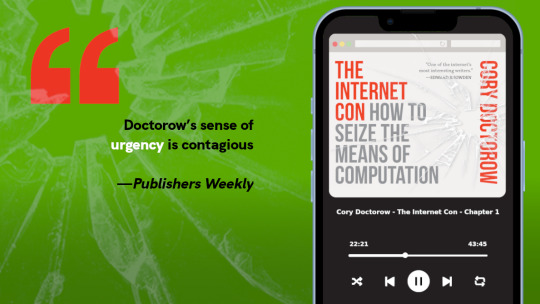
I’m kickstarting the audiobook for “The Internet Con: How To Seize the Means of Computation,” a Big Tech disassembly manual to disenshittify the web and bring back the old, good internet. It’s a DRM-free book, which means Audible won’t carry it, so this crowdfunder is essential. Back now to get the audio, Verso hardcover and ebook:
http://seizethemeansofcomputation.org

If you’d like an essay-formatted version of this post to read or share, here’s a link to it on pluralistic.net, my surveillance-free, ad-free, tracker-free blog:
https://pluralistic.net/2023/08/12/do-not-pay/#fair-debt-collection-practices-act
#pluralistic#jubilee#debts that cant be paid wont be paid#Patrick McKenzie#patio11#bits about money#debt#debt collection#do not pay#bottom feeders#Fair Debt Collection Practices Act#fdcpa#finance#armbreakers
11K notes
·
View notes
Text
Legal Debt Settlement Agency Provide Legal Support and Litigation Assistance:
Legal Debt Settlement services are crucial in complex cases or when debtors refuse to cooperate. Their expertise allows them to evaluate the feasibility of legal action, form alliances with legal professionals, and even commence litigation if required. Thanks to their involvement, businesses can benefit from ongoing legal support and guidance throughout the entire debt recovery process
This partnership guarantees access to specialized knowledge and litigation assistance, making it easier for businesses to navigate the complexities of debt collection and overcome obstacles. With legal support at their side, companies can approach debt recovery with increased confidence and efficiency.

#debt settlement#legal debt collection#debt collection laws#debt settlement programs#legal collections#business debt collection agency
0 notes
Text
Update #2
I was able to file my response at the courthouse and Mail the certified copy to the lawyer today.
The cost of all that came out to about $25 so I am extremely grateful for the person who donated to my gofundme.
I was an anxious mess when I got home, and I am super grateful for living with my friend group so that upon getting home they helped a lot in my decompressing.
Thank you for boosting my posts and thank you for the people helping me!
CashApp: $DresdenOHaraGray
PayPal: @Dresdenohg
GoFundMe:
#debt collection#go fund me#money#personal debt#credit cards#dumpster fire#credit#law#i'm being sued#im being sued#financial assistance#finance#financial#how to earn money#gofundme#raising funds#fundraising#update
0 notes
Text
Good question:

In the United States, many jails and prisons can and will charge you money for every single night that you spend imprisoned, for the entire duration of your incarceration, as if you were being billed for staying at a hotel. Even if you are incarcerated for years. Adding up to tens of thousands of dollars. What happens when you’re released?
In response to this:
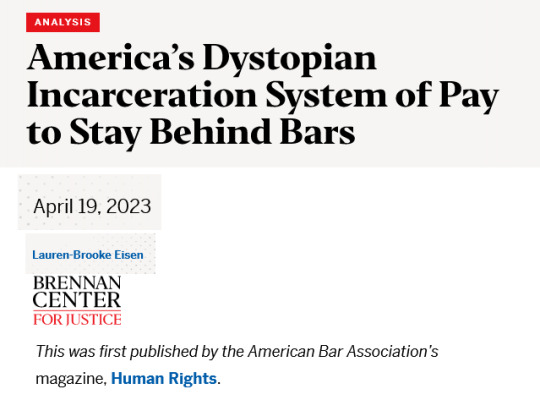


---
So.
You’re getting charged, like, ten dollars every time you even submit a request form to possibly be seen by a doctor or dentist.
You’re getting charged maybe five dollars for ten minutes on the phone.
Any time a friend or family tries to send you like five dollars so that you can buy some toothpaste or lotion, or maybe a snack from the commissary since you’re diabetic and the “meals” have left you malnourished, maybe half of that money gets taken as a “service fee” by the corporate contractor that the prison uses to manage your pre-paid debit card. So you’re already losing money every day just by being there.
What happens if you can’t pay?
In some places, after serving just a couple of years for drugs charges, almost 20 years after being released, the state can still hunt you down for over $80,000 that you “owe” as if it were a per-night room-and-board accommodations charge, like this recent highly-publicized case in Connecticut:
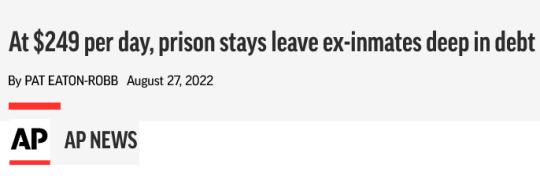

Excerpt:
Two decades after her release from prison, [TB] feels she is still being punished. When her mother died two years ago, the state of Connecticut put a lien on the Stamford home she and her siblings inherited. It said she owed $83,762 to cover the cost of her 2 1/2 year imprisonment for drug crimes. [...] “I’m about to be homeless,” said [TB], 58, who in March [2022] became the lead plaintiff in a lawsuit challenging the state law that charges prisoners $249 a day for the cost of their incarceration. [...] All but two states have so-called “pay-to-stay” laws that make prisoners pay for their time behind bars [...]. Critics say it’s an unfair second penalty that hinders rehabilitation by putting former inmates in debt for life. Efforts have been underway in some places to scale back or eliminate such policies. Two states — Illinois and New Hampshire — have repealed their laws since 2019. [...] Pay-to-stay laws were put into place in many areas during the tough-on-crime era of the 1980s and ’90s, said Brittany Friedman, an assistant professor of sociology at University of Southern California who is leading a study of the practice. [...] Connecticut used to collect prison debt by attaching an automatic lien to every inmate, claiming half of any financial windfall they might receive for up to 20 years after they are released from prison [...].
Text by: Pat Eaton-Robb. “At $249 per day, prison stays leave ex-inmates deep in debt.” AP News / The Associated Press. 27 August 2022.
---
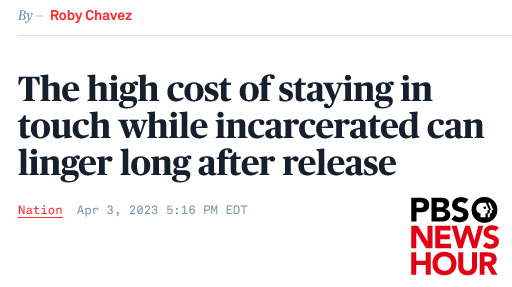
---
Look at this:
To help her son, Cindy started depositing between $50 to $100 a week into Matthew’s account, money he could use to buy food from the prison commissary, such as packaged ramen noodles, cookies, or peanut butter and jelly to make sandwiches. Cindy said sending that money wasn’t necessarily an expense she could afford. “No one can,” she said. So far in the past month, she estimates she sent Matthew close to $300. But in reality, he only received half of that amount. The balance goes straight to the prison to pay off the $1,000 in “rent” that the prison charged Matthew for his prior incarceration. [...] A PA Post examination of six county budgets (Crawford, Dauphin, Lebanon, Lehigh, Venango and Indiana) showed that those counties’ prisons have collected more than $15 million from inmates — almost half is for daily room and board fees that are meant to cover at least a portion of the costs with housing and food. Prisoners who don’t work are still expected to pay. If they don’t, their bills are sent to collections agencies, which can report the debts to credit bureaus. [...] Between 2014 and 2017, the Indiana County Prison — which has an average inmate population of 87 people — collected nearly $3 million from its prisoners. In the past five years, Lebanon’s jail collected just over $2 million in housing and processing fees.
Text by: Joseph Darius Jaafari. “Paying rent to your jailers: Inmates are billed millions of dollars for their stays in Pa. prisons.” WHYY (PBS). 10 December 2019. Originally published at PA Post.
---
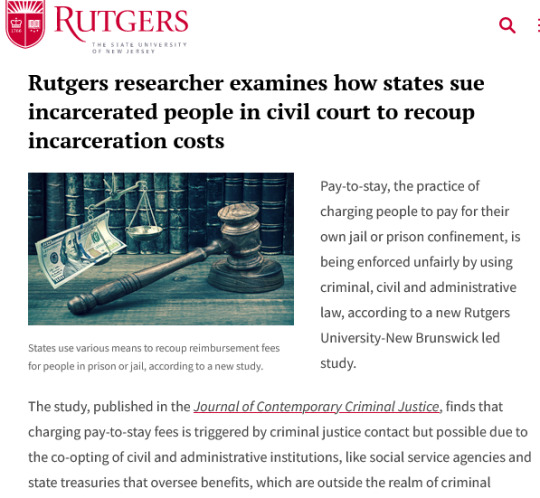
Pay-to-stay, the practice of charging people to pay for their own jail or prison confinement, is being enforced unfairly by using criminal, civil and administrative law, according to a new Rutgers University-New Brunswick led study. The study [...] finds that charging pay-to-stay fees is triggered by criminal justice contact but possible due to the co-opting of civil and administrative institutions, like social service agencies and state treasuries that oversee benefits, which are outside the realm of criminal justice. “A person can be charged $20 to $80 a day for their incarceration,” said author Brittany Friedman, an assistant professor of sociology and a faculty affiliate of Rutgers' criminal justice program. “That per diem rate can lead to hundreds of thousands of dollars in fees when a person gets out of prison. To recoup fees, states use civil means such as lawsuits and wage garnishment against currently and formerly incarcerated people, and regularly use administrative means such as seizing employment pensions, tax refunds and public benefits to satisfy the debt.” [...] Civil penalties are enacted on family members if the defendant cannot pay and in states such as Florida, Nevada and Idaho can occur even after the original defendant is deceased. [...]
Text by: Megan Schumann. “States Unfairly Burdening Incarcerated People With “Pay-to-Stay” Fees.” Rutgers press release. 20 November 2020.
---
So, to pay for your own imprisonment, states can:
-- hunt you down for decades (track you down 20 years later, charge you tens of thousands of dollars, and take your house away)
-- put a lien on your vehicle, house
-- garnish your paycheck/wages
-- seize your tax refund
-- send collections agencies after you
-- take your public assistance benefits
-- sue you in civil court
-- take money from your family even after you’re dead
9K notes
·
View notes